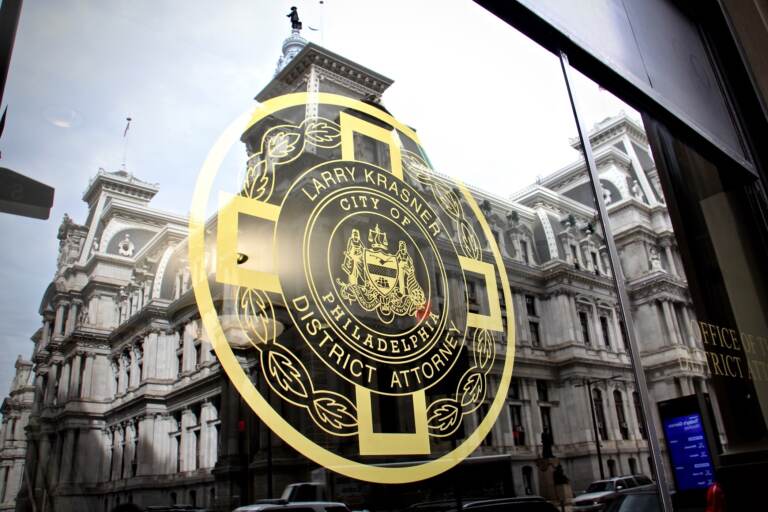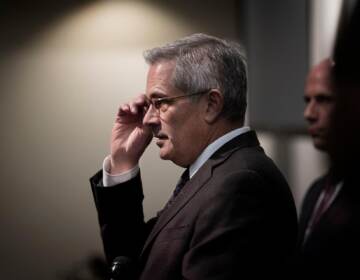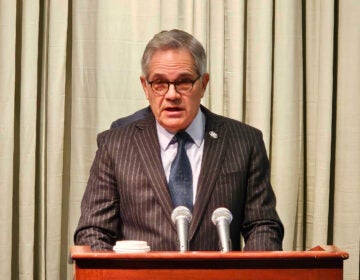DA seeks contempt order against Philadelphia Police for failure to disclose officers’ disciplinary records
Krasner says his office sent out thousands of subpoenas asking for disciplinary records and received copies in which key information was redacted.

Philadelphia City Hall is reflected in the windows of the Office of the District Attorney. (Emma Lee/WHYY)
The District Attorney’s Office, with Conviction Integrity Unit Supervisor Patricia Cummings, filed six motions Wednesday in Common Pleas Court asking a judge to hold the Philadelphia Police Department in contempt of court for failure to turn over complete police disciplinary records.
The records are used to maintain the Police Misconduct Disclosure Database as part of the effort by the DA’s Office to meet its constitutional obligations.
A press release issued by the DA’s Office called the motions “an unprecedented action taken … to address long-standing failures in the criminal legal system that have resulted in convictions of innocent people, numerous lawsuits against the City of Philadelphia, vacated convictions of people whose rights were violated by the PPD and prior DA administrations, as well as an untold number of convictions jeopardized by failure to properly disclose information to judges and juries.”
At an afternoon news conference, DA Larry Krasner said his office had sent out thousands of subpoenas asking for disciplinary records and was given redacted copies in which key information was blacked out.
In some cases, Krasner said, the Public Defender’s Office had received more information from its subpoenas, specifically Internal Affairs investigation records, than his office had.
“They are not turning over information [to] the defense … and, in some instances, there have been very tragic results, innocent people sitting in jail for decades,” Krasner said.
Among the examples cited in the contempt motions is one in which a police officer was the only witness in a firearms possession case. In court filings, the Police Department said the officer was given a penalty of “training and counseling” by the Police Board of Inquiry, but it did not disclose the charge against him or the departmental violations leading up to his penalty.
Another case involved an officer with sustained charges of falsification of documents that were not disclosed to the DA’s Office, which it considers a failure to provide information to the defense as required by law.
What is being sought is commonly referred to as “impeaching information,” Cummings said. Such information, which in many cases could be favorable to the defense, must be disclosed as part of pretrial discovery under the Constitution.
Information about an officer’s prior use of excessive force or lying in a prior criminal investigation could cause credibility issues, Cummings said, and she contended the Police Department is not turning over that information.
Claims of racial bias are also at issue, said Cummings.
“We need to know about it,” she said, “because not only could it affect our decisions on whether or not we should be prosecuting the case, but we certainly need to know about it because it’s our obligation to turn it over to the defense.”
Cummings said this is not the first time the District Attorney’s Office has attempted to resolve the dispute. “We have tried to convince the Police Department this is a broken way of doing things.”
The Police Department said it did not know about the motions until Wednesday and declined to comment.
Krasner put part of the blame for the situation on the Fraternal Order of Police, the union that represents officers.
“The leadership of the union has been hell-bent on preventing access to constitutionally required information for time immemorial,” Krasner said.
“The only people being helped by this system are a small number of dirty cops,” he added. “That is all that the leadership of the FOP cares about.”
A spokesperson for the FOP said it would not comment on Krasner’s statement.
The request filed Wednesday also included a motion to consolidate all the cases under one judge, with potential for an order that would establish an overseer to monitor the situation in the future, said Cummings.

Get daily updates from WHYY News!
WHYY is your source for fact-based, in-depth journalism and information. As a nonprofit organization, we rely on financial support from readers like you. Please give today.







